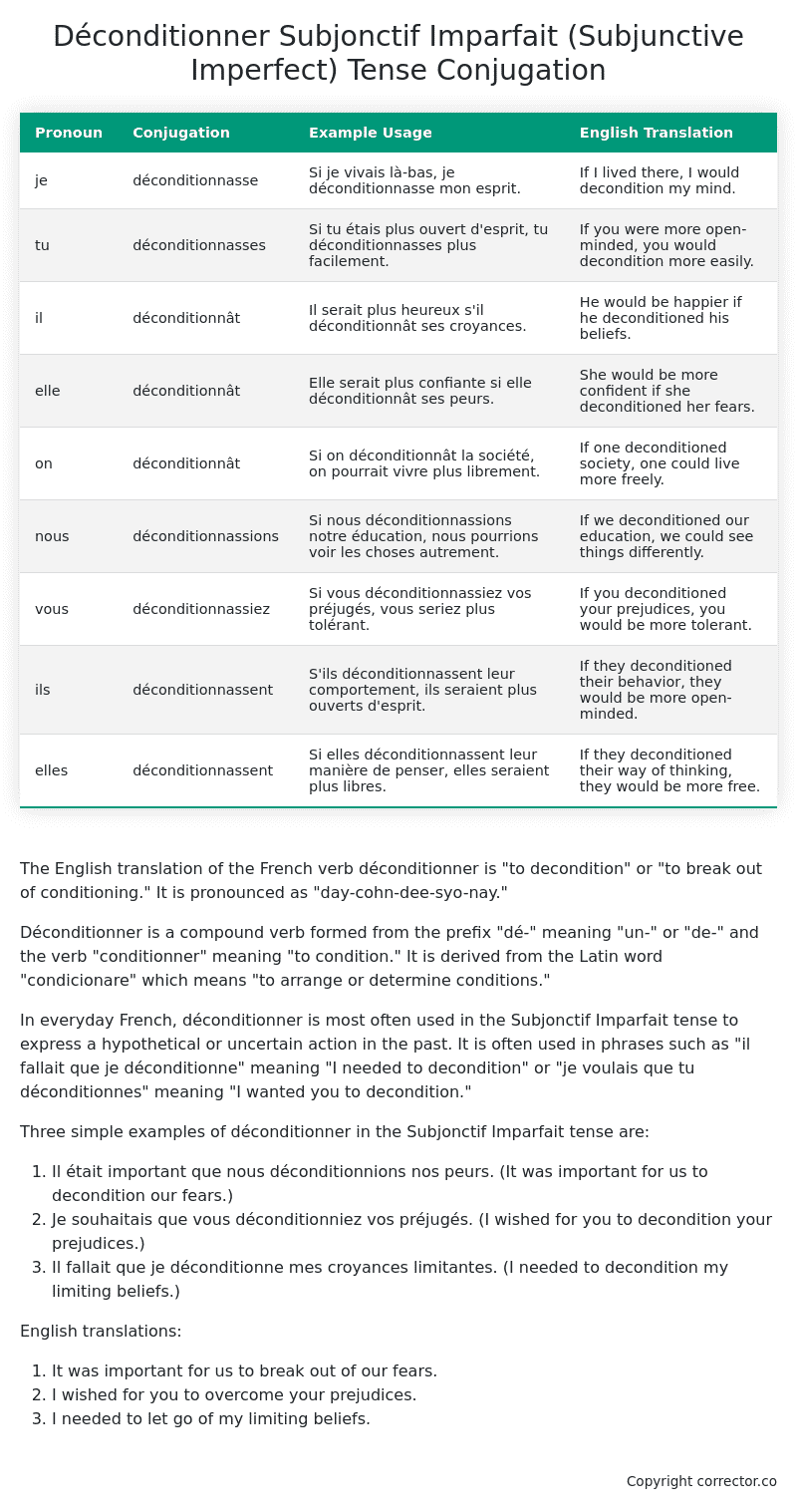Subjonctif Imparfait (Subjunctive Imperfect) Tense Conjugation of the French Verb déconditionner
Introduction to the verb déconditionner
The English translation of the French verb déconditionner is “to decondition” or “to break out of conditioning.” It is pronounced as “day-cohn-dee-syo-nay.”
Déconditionner is a compound verb formed from the prefix “dé-” meaning “un-” or “de-” and the verb “conditionner” meaning “to condition.” It is derived from the Latin word “condicionare” which means “to arrange or determine conditions.”
In everyday French, déconditionner is most often used in the Subjonctif Imparfait tense to express a hypothetical or uncertain action in the past. It is often used in phrases such as “il fallait que je déconditionne” meaning “I needed to decondition” or “je voulais que tu déconditionnes” meaning “I wanted you to decondition.”
Three simple examples of déconditionner in the Subjonctif Imparfait tense are:
- Il était important que nous déconditionnions nos peurs. (It was important for us to decondition our fears.)
- Je souhaitais que vous déconditionniez vos préjugés. (I wished for you to decondition your prejudices.)
- Il fallait que je déconditionne mes croyances limitantes. (I needed to decondition my limiting beliefs.)
English translations:
- It was important for us to break out of our fears.
- I wished for you to overcome your prejudices.
- I needed to let go of my limiting beliefs.
Table of the Subjonctif Imparfait (Subjunctive Imperfect) Tense Conjugation of déconditionner
| Pronoun | Conjugation | Example Usage | English Translation |
|---|---|---|---|
| je | déconditionnasse | Si je vivais là-bas, je déconditionnasse mon esprit. | If I lived there, I would decondition my mind. |
| tu | déconditionnasses | Si tu étais plus ouvert d’esprit, tu déconditionnasses plus facilement. | If you were more open-minded, you would decondition more easily. |
| il | déconditionnât | Il serait plus heureux s’il déconditionnât ses croyances. | He would be happier if he deconditioned his beliefs. |
| elle | déconditionnât | Elle serait plus confiante si elle déconditionnât ses peurs. | She would be more confident if she deconditioned her fears. |
| on | déconditionnât | Si on déconditionnât la société, on pourrait vivre plus librement. | If one deconditioned society, one could live more freely. |
| nous | déconditionnassions | Si nous déconditionnassions notre éducation, nous pourrions voir les choses autrement. | If we deconditioned our education, we could see things differently. |
| vous | déconditionnassiez | Si vous déconditionnassiez vos préjugés, vous seriez plus tolérant. | If you deconditioned your prejudices, you would be more tolerant. |
| ils | déconditionnassent | S’ils déconditionnassent leur comportement, ils seraient plus ouverts d’esprit. | If they deconditioned their behavior, they would be more open-minded. |
| elles | déconditionnassent | Si elles déconditionnassent leur manière de penser, elles seraient plus libres. | If they deconditioned their way of thinking, they would be more free. |
Other Conjugations for Déconditionner.
Le Present (Present Tense) Conjugation of the French Verb déconditionner
Imparfait (Imperfect) Tense Conjugation of the French Verb déconditionner
Passé Simple (Simple Past) Tense Conjugation of the French Verb déconditionner
Passé Composé (Present Perfect) Tense Conjugation of the French Verb déconditionner
Futur Simple (Simple Future) Tense Conjugation of the French Verb déconditionner
Futur Proche (Near Future) Tense Conjugation of the French Verb déconditionner
Plus-que-parfait (Pluperfect) Tense Conjugation of the French Verb déconditionner
Passé Antérieur (Past Anterior) Tense Conjugation of the French Verb déconditionner
Futur Antérieur (Future Anterior) Tense Conjugation of the French Verb déconditionner
Subjonctif Présent (Subjunctive Present) Tense Conjugation of the French Verb déconditionner
Subjonctif Passé (Subjunctive Past) Tense Conjugation of the French Verb déconditionner
Subjonctif Imparfait (Subjunctive Imperfect) Tense Conjugation of the French Verb déconditionner (this article)
Conditionnel Présent (Conditional Present) Tense Conjugation of the French Verb déconditionner
Conditionnel Passé (Conditional Past) Tense Conjugation of the French Verb déconditionner
L’impératif Présent (Imperative Present) Tense Conjugation of the French Verb déconditionner
L’infinitif Présent (Infinitive Present) Tense Conjugation of the French Verb déconditionner
Struggling with French verbs or the language in general? Why not use our free French Grammar Checker – no registration required!
Get a FREE Download Study Sheet of this Conjugation 🔥
Simply right click the image below, click “save image” and get your free reference for the déconditionner Subjonctif Imparfait tense conjugation!

Déconditionner – About the French Subjonctif Imparfait (Subjunctive Imperfect) Tense
Formation
Common Everyday Usage Patterns
Interactions with Other Tenses
Subjonctif Présent
Indicatif Passé Composé
Conditional
Conditional Perfect
Summary
I hope you enjoyed this article on the verb déconditionner. Still in a learning mood? Check out another TOTALLY random French verb conjugation!


